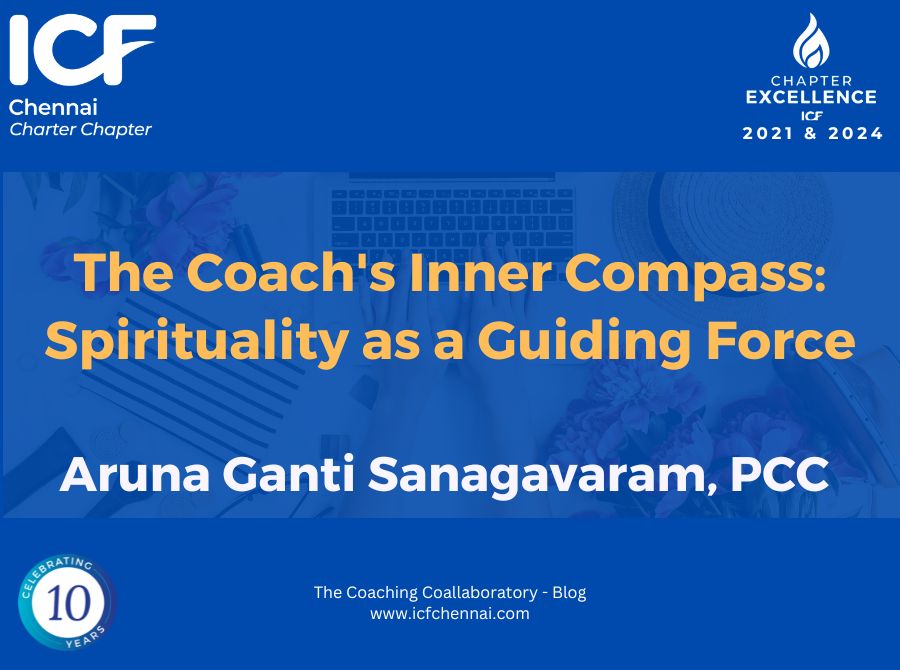The Coach’s Inner Compass: Spirituality as a Guiding Force

“What is the participant feedback on my session?”
“I want your honest comments about Demo. I was not at all happy with what I did.”
This recent dialogue with a coach, referring to his demo session, took an interesting turn. The feedback painted a very different picture: 50% ranked the session a perfect 10, while the rest marked it as 9 or 8, with only 10% choosing 7.
While this coach had the luxury of clear, immediate feedback, how often do we, as coaches, find ourselves in such an advantageous position? We rarely get explicit data like this.
So, how do we truly gauge the efficiency of our coaching?
” Did we do a good job with the client? “
“Am I a good coach?” These questions are incredibly common, though their frequency may lessen as we develop.
When we’re starting our training and in the initial days of coaching, our focus often tends to be on the mechanics – asking the “right” questions, all while trying to be fully present with the client. Have you ever felt like you were trying a little too hard?
Perhaps the “aha” moment we’re expecting isn’t even on the client’s agenda. It takes some time to realize that dancing with the client is actually about embodying the coaching principles and competencies we initially tried so hard to remember.
For me, transcending the stage of sticking to the process to genuinely being a coach happened organically. Looking back, my spiritual journey and my coaching journey started simultaneously, ignited by a desire to uncover my purpose and intentionally design my life accordingly.
Beyond Mechanics: Insights from Ancient Wisdom
Could something beyond mere technique guide our most impactful coaching sessions? Interestingly, profound insights shaping my coaching journey come from ancient wisdom, particularly the Bhagavad Gita. These principles offer a powerful framework for how we show up as coaches:
- Doing my prescribed duty: Being fully with the client in the moment. Is this merely a skill, or is there a deeper principle of dedication and selfless action at play? Practically, this means cultivating undivided presence, letting go of distractions, and truly hearing what’s being said and unsaid.
- Observing the process and forsaking “I am the doer” mentality: When we release the need to control the outcome, realizing we are not the sole orchestrators of the client’s progress, new possibilities open up in the coaching space. This non-attachment to results allows for genuine curiosity and the freedom to explore without imposing our agenda.
- Like a water drop on the Lotus leaf – It does not get attached to the leaf but moves along with the leaf: What if we approached coaching with this same detachment from results, simply being with the client as their journey unfolds, without getting entangled in the outcome? This metaphor beautifully illustrates being engaged without being entangled, enabling us to witness and support without attachment to a specific solution.
Anchoring Ourselves and Our Clients
These spiritual concepts aren’t just abstract ideas; I find them incredibly practical for coaching. When I tap into this deeper wellspring, I create a more authentic and impactful experience for my clients. This inner connection becomes an unseen anchor for both of us, directly stemming from the insights of ancient wisdom.
Think about how having inner peace and feeling connected—like the Bhagavad Gita’s advice to do my duty without getting attached to the results—changes how I show up as a coach. It’s not about being spiritual in a preachy way. It’s about seeing how these deeper ideas shape every talk I have.
When I coach with true presence, like a “water drop on a lotus leaf,” I’m fully involved but not trying to control my client’s path. This way of letting go of the “I am the doer” mindset is my unseen anchor. It creates a deep sense of trust and authenticity. Clients feel truly seen and supported, which helps them explore challenges and find their own answers. This steady base helps them transform.
Ultimately, the goal isn’t just to be a “good” coach by following rules. It’s about being a truly present, empathetic, and impactful guide. Like the lotus leaf, my greatest strength might be my ability to be fully involved without getting hung up on the results, letting real transformation unfold naturally.
What part of your own journey, perhaps even unknowingly, has contributed to your evolution as a coach beyond the mechanics?
Aruna Sanagavaram
The views and opinions expressed in guest posts featured on this blog are those of the author and do not necessarily reflect the opinions and views of the International Coach Federation (ICF). The publication of a guest post on the ICF Blog does not equate to an ICF endorsement or guarantee of the products or services provided by the author.
Additionally, for the purpose of full disclosure and as a disclaimer of liability, this content was possibly generated using the assistance of an AI program. Its contents, either in whole or in part, have been reviewed and revised by a human. Nevertheless, the reader/user is responsible for verifying the information presented and should not rely upon this article or post as providing any specific professional advice or counsel. Its contents are provided “as is,” and ICF makes no representations or warranties as to its accuracy or completeness and to the fullest extent permitted by applicable law specifically disclaims any and all liability for any damages or injuries resulting from use of or reliance thereupon.


Your article is very impactful and connect with my inner core. The oncology in coaching transforms the coachee to create more clarity and arrive at the life goal and purpose of life. Well thought out article and my wishes to Coach Aruna.